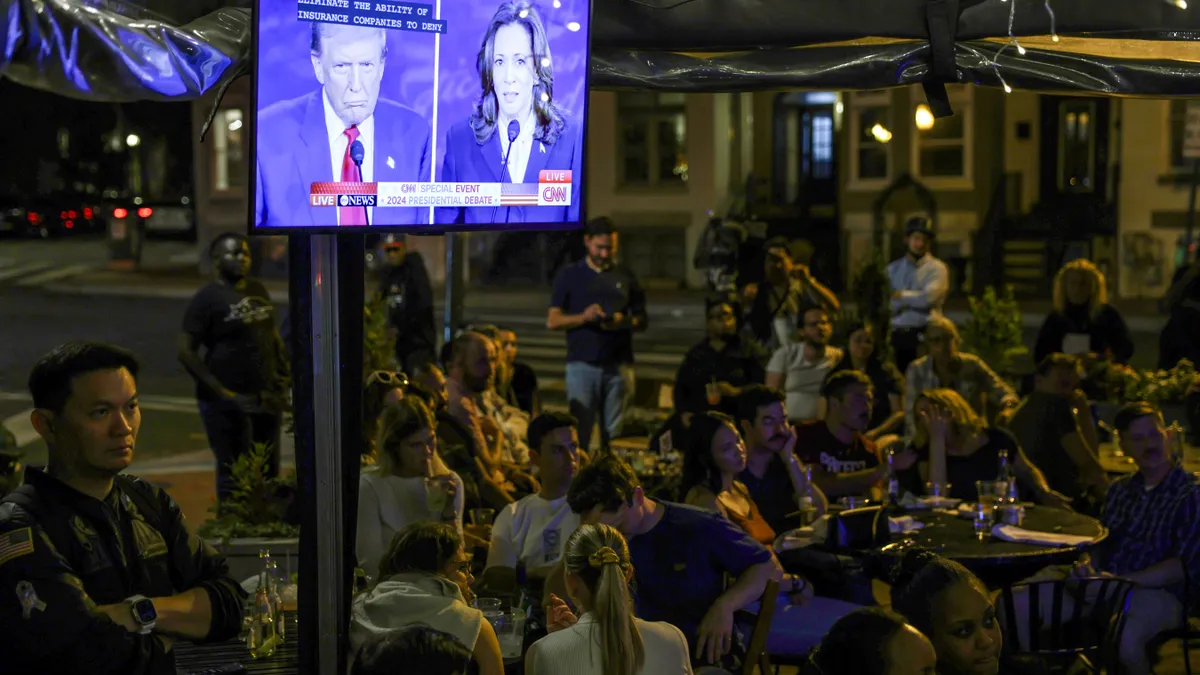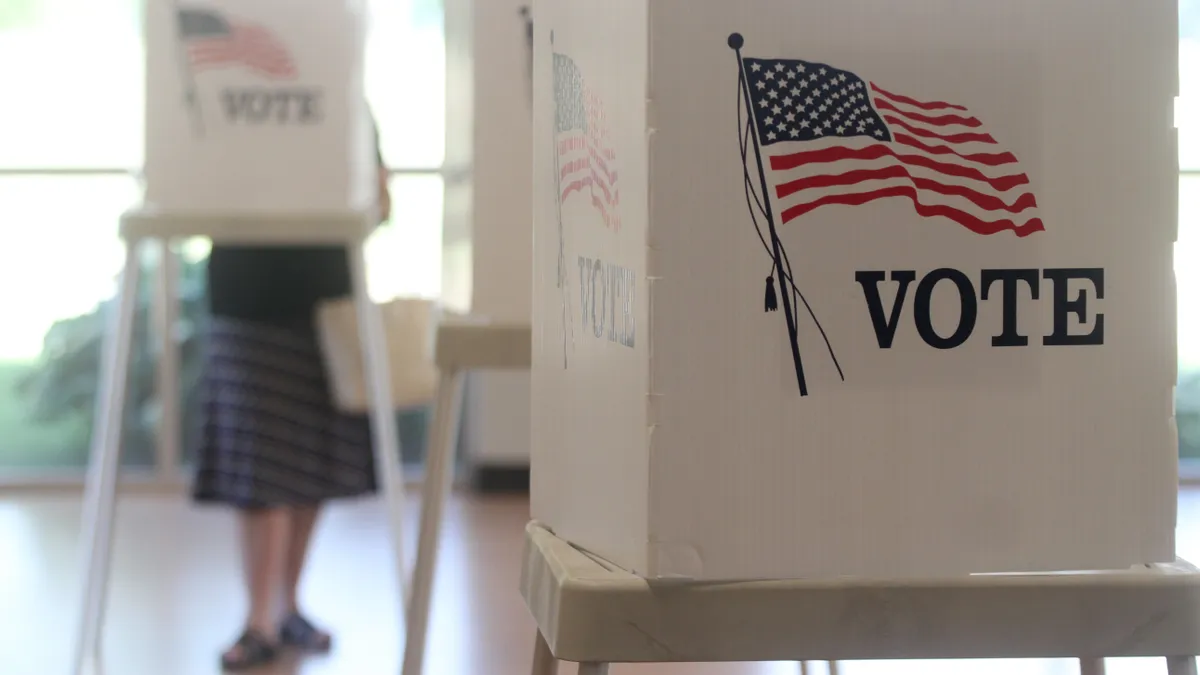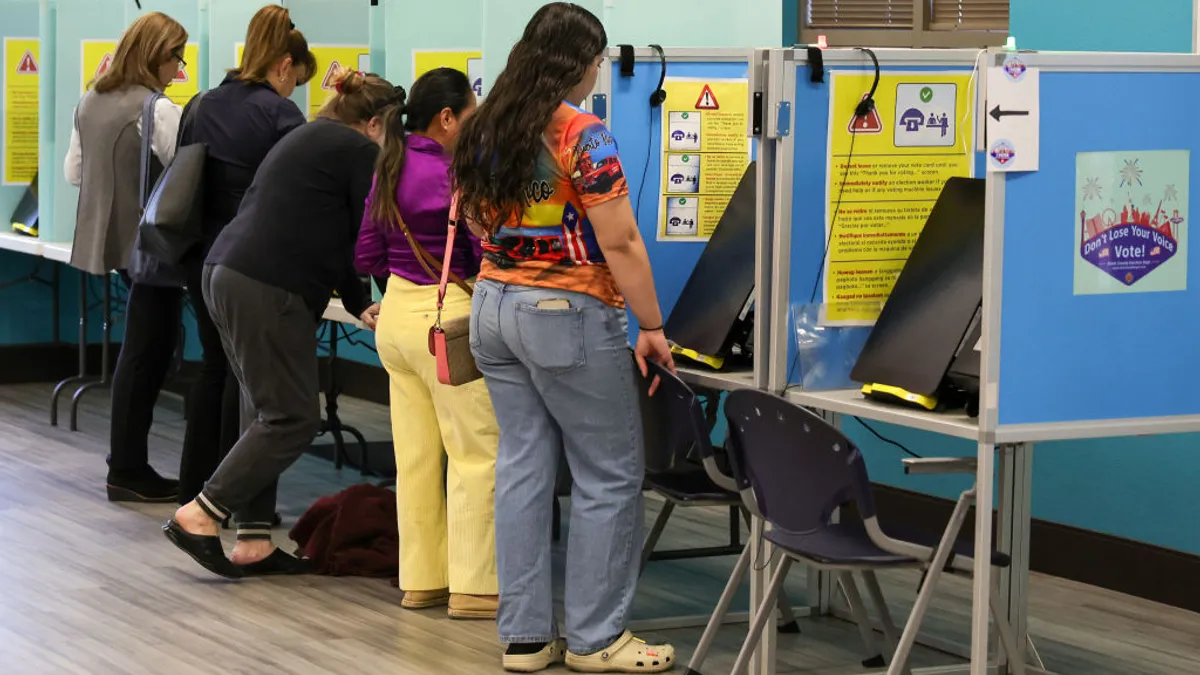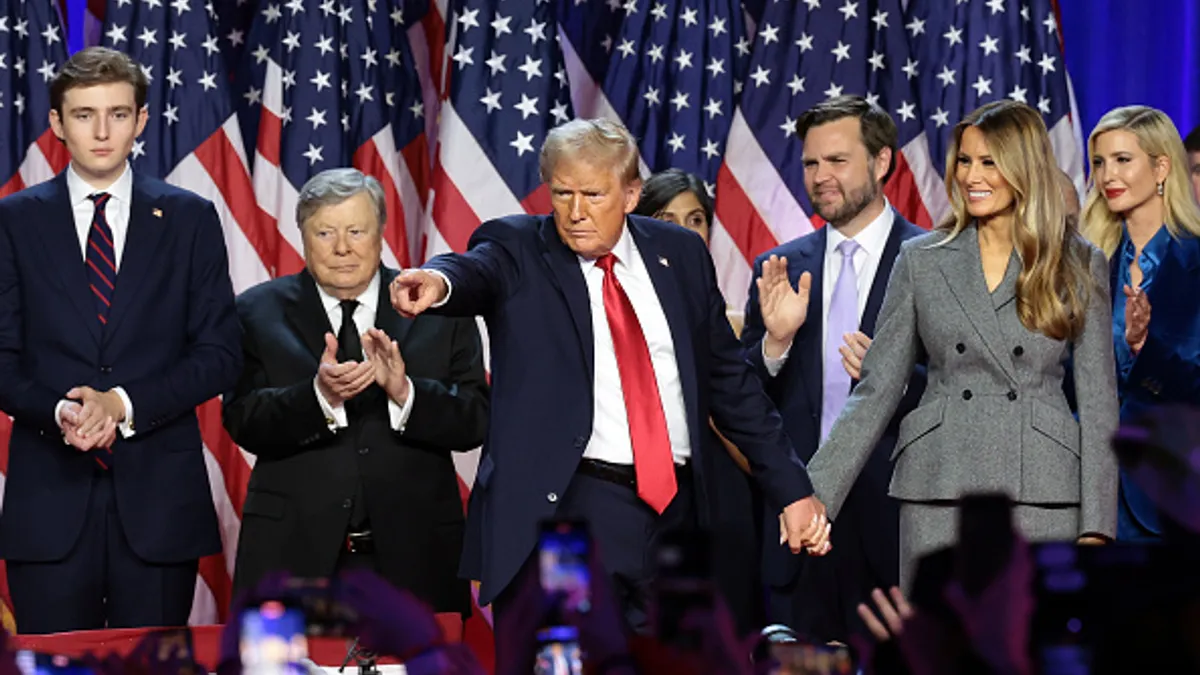As a consequential U.S. election nears in less than a month, determining political control of Congress and the White House, political speech in the workplace is rising. Millions of voters — especially those in seven so-called “swing states” — are saturated with political advertising across their televisions, phones and computers.
While U.S. laws don’t prevent employers from policing the type of speech permitted in their workplaces, the issue is particularly fraught as some states have specific laws protecting political speech at work. Meanwhile, federal laws generally seek to protect certain types of activities in the workplace, such as the right to assemble or to organize a labor union or other type of employee group.
All of which is to say that countless companies — and their human resources and in-house legal counsel — are left contending with the potential for political speech to mutate in ways that could create legal problems.

To explore some of these issues from the employer perspective, Legal Dive checked in on Oct. 10 with Kacey Riccomini, an employment litigation partner and advisor at Thompson Coburn LLP in Los Angeles.
Editor’s note: Legal Dive’s conversation with Riccomini has been edited for clarity and length.
LEGAL DIVE: We’re less than a month from the U.S. presidential election. Does this issue of political speech at work ramp up as we get closer to the big day?
KACEY RICCOMINI: It definitely does. And I would say that the more active political candidates or parties are...whether it’s over any form of media or posting themselves, the more that people tend to repeat it or refer to it, and sometimes that’s in the workplace and may not be entirely appropriate.
What is the usual venue for these types of speech complaints? Does it go to HR, maybe to the in-house counsel? And where do these generally get resolved?
If there is, let’s say it’s a post online, or maybe it’s a statement made by another employee in the workplace, usually that’s brought to HR’s attention. It might be brought to a supervisor and escalated to HR and then, depending on the issues involved, and the employees as well, it may also be escalated to in-house counsel or potentially external, outside counsel.
What does a resolution look like, in your experience?
It could be a variety of things. It really depends on the circumstances. It could be that some statements may not run afoul of certain laws like the (California) Fair Employment and Housing Act or Title 7 of the Civil Rights Act. And so there’s not much to be done about those statements. It may be a conversation with the employees about maintaining a respectful discourse, or if they can’t do that, to perhaps not engage with one another in that discourse, but if there is something else to the post or the statement that’s made that really is a concern under, for example, Title 7, the Fair Employment and Housing Act, or the Crown Act, something along those lines, then discipline, up to and including termination, may be something that has to occur.
(The Crown Act is a law in about half of U.S. states that protects against discrimination based upon a person’s hairstyle or hair texture.)
Is there much litigation around hostile political speech? One would think that a plaintiff’s attorney could do a lot with some of the more extreme instances, but maybe not?
I would say that the vast majority of, let’s say, discrimination suits, are really focused on statements by other employees, maybe a supervisor or manager, and some of them have a political aspect to them, but the focus of those statements is, really, is it discriminatory? Which is the proper focus under pertinent employment laws in California and federally? So while politics may be an influence, there haven’t been that many claims that strictly focus on statements that are allegedly political in nature. The focus really should be, does this statement or post violate any other laws and we have to address it, or does it not?
If you go online, you can see the most extreme forms of political speech, and I guess I’m surprised this extreme nature has not gotten into the workplace in a way that leads to litigation.
That’s somewhat of a recent development as of this year, just statements that are made outside of the workplace and whether they have an impact in the workplace is something that employers are going to have to evaluate. There was a recent case out of the Ninth Circuit, Okonowsky v Garland, and in that case, an employee was targeted by another employee on Instagram. There were a variety of problematic statements that were made, but some of them were sexually violent in nature. And the Ninth Circuit was pretty clear there that offsite or third-party conduct could have the effect of altering the working environment to make it severe or pervasive from a harassment standard. So it may just be that there weren’t too many test cases before, and the view being that, well, if something occurs outside of the workplace, you know, maybe we don’t have to address it, but that’s not really the case. And if something like that is brought to an employer’s attention, they really should investigate it and address it and work with their counsel.
Do you think we’ll see more cases? And what do you do as an employer with a potential legal problem? Does the employer need to watch a particular person every day, just because they could become a liability?
Well, I mean, I wouldn’t necessarily recommend daily monitoring, for example, of an employee, but you know, really, the focus should be on, what is the behavior? Does it run afoul of any laws? Do we need to address it? It may be a conversation with the employee. So you know that there's a concern that's arising from some of their statements.
But to get back to your point, I do think there is likely to be litigation in the future that arises from these kinds of statements by employees, or that are repeated statements from political actors. One is the case that came out of the Ninth Circuit that I mentioned. Another is that there are a variety of states that have enacted or are enacting laws that protect employee political speech. To a certain extent, there are limitations. And then as you kind of mentioned, the radicalization, or really the polarization between the two parties has led to, you know, kind of a lack of middle ground and a difficulty in people having respectful conversations where there may be a difference of opinion.
What are some of the questions that you get most frequently from clients?
The concerns generally arise because someone at work has repeated a statement that a politician or political party is making that targets a particular group that, under California and federal employment laws are really protected. So when that occurs in the workplace, there can be some confusion about whether the employer can address it to what extent, if there are any protections that they should be aware of when it comes to the employee making the statement...as well as the employee who's subject to it. So there is some confusion about what is and is not protected, and in what context.
What advice do you give employers who ask if they should have policy around social media usage or around speech at work?
It’s a good idea to have those policies in place. They should be reviewed and evaluated by counsel to make sure that they are compliant, and because employment law rapidly evolves, in my experience, it’s a good idea to periodically check in. It’s not necessarily a problem to prohibit threatening, physically threatening speech, something like that.
But there’s a difference in, really, how far that goes and what level of specificity you want to get into in the policy. So there’s been a recent case, the Stericycle case that came out of the National Labor Relations Board, and the employer did have a variety of policies, including a social media policy, and ran into some issues because the policy was not narrow enough in the National Labor Relations Board’s view, and could, in fact, be read as potentially violating or prohibiting protected activity. So it’s a really good idea to have counsel go through those policies and make sure that the conduct that is being addressed is pretty specific and narrow and complies with pertinent laws as they may evolve.
After the election, does political speech calm down or does the unhappy side become very active?
I can’t really predict how people might react to the election. You know, if there is concerning activity later, and it impacts the workplace in some way, employers are going to have to approach it on a case-by-case basis and just be prepared to really enforce their pre-existing anti-discrimination, harassment and retaliation policies to the extent that those posts or activities, or maybe statements at work, might run afoul of them.
What are your thoughts on corporate commentary as we saw in 2020 after George Floyd’s death, where many companies felt compelled to share their views or social values. Is this type of commentary useful for employers at an HR level to try to lower the political temperature? Or is it a bad idea to go there?
I don’t think it’s necessarily a bad idea for companies to make public statements about certain events. It’s definitely something I think is more of a question for a PR firm than it is for HR to make those kinds of statements, but employers can have their own political views and can state them. That’s fine. That’s not necessarily a problem. Where the employer should be careful is, you know, if what they’re saying could be construed as trying to influence or force an employee to adopt or refrain from adopting a political stance or to interfere with that employee’s ability to vote. There are laws specifically in California that prohibit that kind of thing. So it’s fine to have political views, but generally, you know, whether you’re an employee or an employer, it’s important not to go too far at work.
Does California or other states prohibit an employer endorsing candidates and urging their employees to vote a particular way on a candidate or issue?
That’s not something that I would recommend. There are a couple of sections of the California Labor Code that really prohibit interference with employee political activities, threatening employees, for example, if they don’t agree or want to vote a particular way, or to prevent them from voting a particular way.
How did you get interested in being a lawyer?
I didn't originally think that I wanted to be a lawyer, and I ended up taking some legal courses in undergrad and discovered that I really liked it, and that was pretty much it for me.
What were you studying as an undergrad? What did you think you were going to do?
I thought that I was going to be a novelist, so I decided to start with an English degree.
When you were starting law school did you know at the time what sort of law you wanted to practice?
I knew I wanted to be in the courtroom. I wanted to argue, I wanted to take depositions. I didn’t have a specialty picked out at the time. I knew I wanted to do a lot of litigation, and then I wound up working on employment cases, enjoying those and getting good results, and that’s really what led me to specialize. So here I am, I do litigation as well as consulting for employers.


















